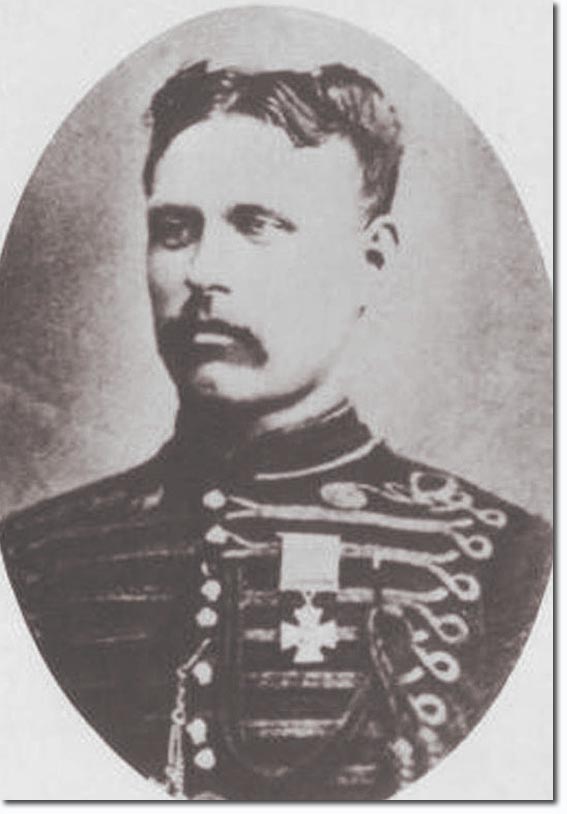|
|


|
|
James Collis was born in Cambridge on 19 April 1856. He served in E Battery, B Brigade in Afghanistan during the Second Afghan War. The battery was part of Brigadier-General Burrows’ column that set out from Kandahar in July 1880 to intercept the large enemy force under Ayub Khan. The battle of Maiwand took place on 27 July 1880. According to Collis’s own eye-witness account he was a limber gunner whose gun initially fired ‘common shell’ from the right of the battery. The first shot from the enemy artillery struck the wheel of his gun, killing a gunner, wounding another man and an officer. He saw Sergeant Wood killed and four others, as well as many horses. He took Sgt Wood’s place now that there were only 3 of them to man the gun. When a lull occurred in the artillery duel General Nuttall led a charge of native cavalry which was joined by Gunner Smith who mounted a battery horse and charged alongside the General. After going 300 yards the whole line of native troops turned around and returned to their original position, leaving Nuttall, his British officers and Smith to fight alone. This caused the general to cry, and Smith took it upon himself to charge the enemy alone, and be cut down. Gunner Smith’s name does not appear on Captain Slade’s list of casualties.
Gunner Collis won the VC for his actions the following day, during the retreat to Kandahar. The citation for his award is quite sketchy so it is useful to quote Collis’s written account of his actions at a village called Kokeran, 7.5 miles from Kandahar where he went to fetch water: ‘I was about 150 yards from the gun when I saw 10 or 12 of the enemy’s cavalry coming on at a slow pace towards the gun. The gun went off and I lay down and allowed the gun to pass me, and began firing with a rifle which I had got from a wounded 66th man, in order to draw their fire upon myself, and stop them from going forward with the gun. I was concealed in a little nullah, and I fancy they thought there was more than one man, for they stopped and fired at me from the saddle. I shot one horse and two men. After firing about 35 rounds General Nuttall came up with some native cavalry, and drove them off. When I first saw the enemy they were 300 yards off, when they left they had got 150 yards. General Nuttall asked me my name, saying, “You’re a gallant young man, what is your name?” I said “Gunner Collis of E of B, RHA.” He entered it into a pocket book and rode off. I then followed up my gun, which I found some 500 yards distant by the side of a river. The enemy’s fire, which had been going on all the way from Maiwand, now became hotter, the surrounding hills being full of them. Some of the garrison of Candahar met us about four miles from the fort and escorted us in. I arrived at abut 7pm.’ Although the survivors of the battle and retreat had reached the relative safety of the fortified city of Kandahar, Ayub Khan’s army surrounded the city and laid siege to the garrison and inhabitants. There was a sortie from the fort in August led by General Dewberry which established a defensive position in a village about 200 yards away. Around 15 Aug, Collis was standing by his gun on the rampart when he heard some general officers talking about sending a message to Dewberry. So Collis spoke to General Burnet and volunteered to deliver the message: ‘After a little hesitation General Primrose gave me a note. I was let down a distance of about 30 or 40 feet to the bottom of the ditch by a rope. When half way down I was fired at but not hit, by matchlock men about 250 yards distant, and I scrambled up the open side of the ditch and ran across to the village. I found the officer commanding in the middle of it, and fighting going on all round. I delivered the note and returned. When half way up the rope I was fired at again, one bullet cutting off the heel of my left boot. General Primrose congratulated me and Colonel Burnet gave me a drop out of his flask…..I was recommended for the Victoria Cross without my knowledge about September 10, by Sir F Roberts, on the report of General Nuttall and Colonel Burnet. It was given to me on July 28, 1881.’ James Collis joined the Bombay Police in 1881, and married Adela Skuse in March 1882. He returned to Britain in 1887 and re-enlisted in the army, joining the Suffolk Regiment. After a period in the depot he joined the 1st Battalion out in India in 1888 but was invalided home in 1891. His wife remained in India and he unwisely married Mary Goddard in 1893. As this was a bigamous marriage he was convicted and sentenced to 18 months hard labour. Because of this the authorities declared his VC forfeit. But at some point Collis had pawned his medal for a paltry 8 shillings. On leaving prison he settled in Bury St Edmunds and in 1914 re-joined the Suffolks as a drill instructor. He suffered poor health and was invalided out in Aug 1917. He died at Battersea General Hospital on 28 June 1918 aged 62. He was survived by his rightful widow Adela and three sons. Collis had a military funeral at Wandsworth cemetery but his family did not attend. He finished up in a pauper’s grave with no headstone. Two years later his sister tried to have the forfeiture of his medal overturned. The King indicated he was against forfeitures but there was no discussion on making restorations for stripped medals. The rules were subsequently changed so that a VC winner would have to commit treason, cowardice or any serious crime to have his medal taken away. Back in 1908 the question of whether or not to give back the Cross taken from Collis was raised. However, the Military Secretary said 'it was unnecessary to take any steps unless or until Collis applied for it'. Coincidentally, the last forfeiture of a VC was in 1908, with no cancellations after the King had made his views plain on forfeitures in 1920. The only amendment was to require cancellations and restorations to be gazetted. In 1931, the grounds for expulsion, 'treason, cowardice or any serious crime', which had existed from 1856, and which had been the grounds for which Collis forfeited his own award were amended to the power to 'cancel and annul' awards. A headstone to James Collis was finally erected at the cemetery in 1998. |
Armed Forces | Art and Culture | Articles | Biographies | Colonies | Discussion | Glossary | Home | Library | Links | Map Room | Sources and Media | Science and Technology | Search | Student Zone | Timelines | TV & Film | Wargames